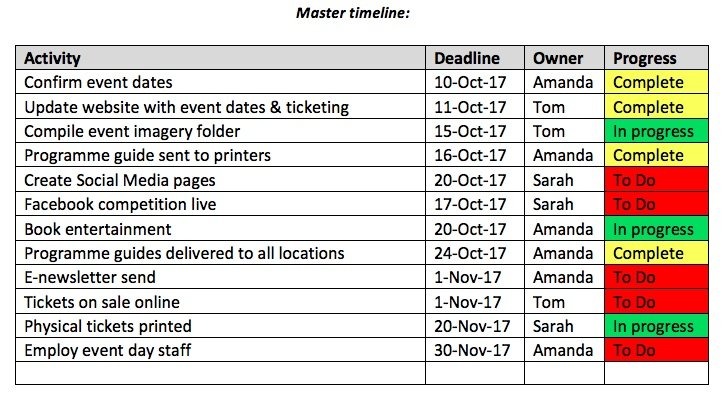
Start by conducting a SWOT Analysis
A SWOT Analysis will enable you to develop an event plan that maximizes the strengths and opportunities for your event and minimizes the weaknesses and threats.
|
STRENGTHS – attributes of the event that will help you achieve the event goal Examples:
|
WEAKNESSES – attributes that could stop you from achieving the event goal Examples:
|
|---|---|
|
OPPORTUNITIES – external forces that increase the chances of achieving the
Examples:
|
THREATS – external forces that could threaten the event from achieving its goal Examples:
|
What, Where, When, Who
The first stage will be to establish the WHAT, WHERE, WHEN, WHO. Here are some things you will need to consider and make decisions about in the planning stage of the event:
Questions for WHAT:
- Why type of event will you class if it as? Sport/ art/ tourism/ charity etc
- What price bracket should the event cost be within?
- What are your customer needs?
- What do you want event attendees to achieve?
- What size audience do you expect?
- What channels will you use to market your event?
Considerations for WHEN:
- Similar events held nearby – ensure you avoid any date clash
- The potential of the event being a re-occurring event or a one-off
- Weather, seasonal constraints, public holidays and school holidays
Considerations for WHERE:
- Event location should be easy for your attendee needs ie public transport, bus turnarounds, walking distance to accommodations
- Event accessibility (international/ domestic/ local)
- Space/ area required to safely house the number of people you anticipate will attend
- Using public spaces, such as gardens or parks, may require council consent which could require submitting an event plan
Questions for WHO:
This should encompass your audience, your team, and your event goal
- Who will participate in or attend the event?
- The demographics of your audience?
- What will appeal to your target audience about this event?
- Who will be in your event organising team?
- Who do you need to engage to make event specifics happen?
- Are there any potential ambassador’s you could approach to help market your event or be involved?
- Who are appropriate sponsors in the area you could source funding from?
Create a master timeline
The second stage will be to create your event’s master timeline. Having a detailed master timeline ensures people are kept on track and are kept accountable for their roles and tasks. You can also add team/ committee meeting dates into your master timeline. The timeline should have the tasks, allocation of responsibilities, and deadlines. This is an internal document for your team only. An easy and efficient way to create and manage a master timeline is with Excel and could look a bit like this:

At this point, you could also make a start on your Communications Plan (more on this in the Promote your event section). It can also be handy to have a Key Milestones document (more on this in the Organise your event section) which identifies the major deadlines your team will be working toward and marketing around, such as Event Dates Announced/ Tickets Go Live/ Registrations Close.